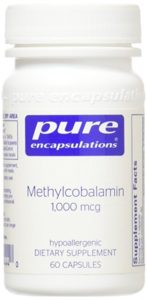B12 Sources and Deficiency Symptoms

Vitamin B12 is an important subject to discuss for those following a vegetarian, vegan, or plant-based lifestyle. As a matter of fact, it’s not just herbivores that need to give this nutrient some serious thought.
Research shows that 1 in 6 meat eaters is deficient in vitamin B12.
This nutrient is not made by plants or animals, but rather is found in the soil.
Consequences of deficiency can be very serious.
What is B12 and why aren’t we getting enough?
Vitamin B12 is not made by plants or animals but by microbes that blanket the earth. In today’s sanitized, modern world, the water supply is commonly chlorinated to kill off any bacteria.
So, while we don’t get much B12 in the water anymore, we don’t get much cholera, either, which is a good thing!—Dr. Michael Greger

Animals obtain vitamin B12 by eating foods that are covered in soil and bacteria.
When a cow eats grass, it pulls up many of the soil-covered roots, which then allow B12 to be absorbed into their intestinal tract.
People who eat animal products, such as meat and dairy, get traces of B12 by eating the flesh of the animals that absorbed it from the dirt.

Primates, indigenous societies, and prehistoric populations never got cobalamin (B12) deficiency because they didn’t have the advanced hygiene techniques that we have today, even if they were eating a plant-based diet.
Their food had enough vitamin B12–containing bacteria on the surfaces to meet their needs.
Humans, unlike other members of the animal kingdom, take great care to clean, wash, and cook their foods, which reduces the vitamin B12 content of any plant foods we may eat.–Shivam Joshi, MD
One in six meat eaters is vitamin B12 deficient
B12 deficiency is often perceived as directly associated with veganism, however multiple studies confirm that deficiency concerns are not limited to those that are plant-based.
In fact, researchers have found that nearly 40 percent of people in the US are deficient in this nutrient.
The Framingham Offspring Study examined the B12 status of 2,999 omnivores, ages ranging from 26–83 and found that 39% of study participants had blood levels of vitamin B12 in the ‘low normal’ to deficient range.
Study participants with the highest B12 levels were not the meat eaters, but the ones taking supplements and eating the most fortified foods such as breakfast cereals.
Some medical issues such as Crohn’s disease, pernicious anemia and atrophic gastritis can interfere with B12 absorption. For those with these conditions, doctors may recommend injectable forms of B12, which do not require gastrointestinal absorption.
B12 deficiency symptoms can be serious
Vitamin B-12 (cobalamin) is a water-soluble vitamin that plays essential roles in red blood cell formation, cell metabolism, nerve function and the production of DNA.
Left untreated, a vitamin B-12 deficiency can lead to anemia, fatigue, muscle weakness, intestinal problems, nerve damage and mood disturbances.—The Mayo Clinic
Vitamin B12 level chart – Global Healing Center
| 180-914 ng/L | Normal high/low range |
| 450+ ng/L | Healthy/Optimal |
| 180-400 ng/L | Conditionally low levels |
| 150-180 ng/L | Low levels where disease symptoms start |
Deficiency symptoms include:
- loss of energy
- tingling
- numbness
- reduced sensitivity to pain or pressure
- blurred vision
- abnormal gait
- sore tongue
- poor memory
- confusion
- hallucinations
- personality changes
B12 foods and sources
Fortunately, vitamin B12 deficiency can easily be prevented.
This nutrient can be found in fortified foods such as:
- breakfast cereals
- plant milks like almond, soy, rice, etc (brands vary so check the labels)
- nutritional yeast
Yet, the simplest and most reliable way to ensure adequate amounts of B12 is to take an oral supplement.
It is possible to get sufficient amounts from B12-fortified foods, but we would have to eat three servings a day of foods each providing at least 25 percent of the Daily Value (on the Nutrition Facts label), with each serving eaten at least four to six hours after the last.
For B12-fortified nutritional yeast, for example, two teaspoons three times a day would suffice. For most of us, though, it would probably be cheaper and more convenient to just take a supplement.–Dr. Michael Greger
The usual supplemental dose of vitamin B12 for the average person is 250 micrograms a day or 2,500 micrograms a week. PURE encapsulation (pictured below) is the B12 supplement recommended by the non-profit integrative healthcare practice and research organization, True North Health Center, founded by Drs. Alan Goldhamer and Jennifer Marano.

So what’s the bottom line
Vitamin B12 is an important and necessary nutrient. However, animal foods are not the best source due to cholesterol, saturated fat, and negative health effects of animal protein.
Everyone--even meat eaters— should monitor their vitamin B12 levels and ensure they have a reliable source by taking a vitamin supplement.
Avoiding vitamin B12 deficiencies is easy and inexpensive, and it is something we should all be mindful of.
The short video below will help answer more questions on this subject.
Links to Amazon.com are affiliate links. When you buy something through my links, I receive a commission that helps support this site which is greatly appreciated.
